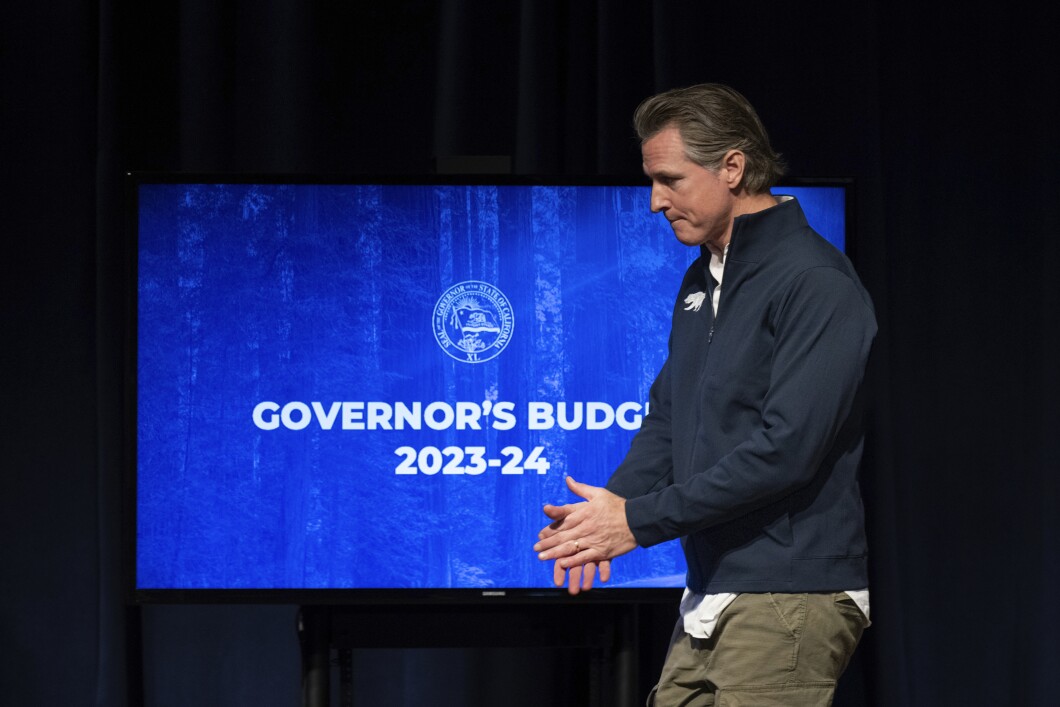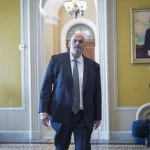
Gov. Gavin Newsom (D-CA) unveiled an updated spending plan in mid-May, sparking concern from local lawmakers and public officials over multiple 2023-24 budget cuts.
The Golden State’s estimated budget deficit has risen by $9 billion since the original budget plan was released in January. It’s a stark contrast from last year’s federal surplus. Newsom announced the budget deficit reached $31.5 billion as of May.
ONE QUESTION FOR TRUMP COULD DETERMINE THE RACE FOR THE 2024 GOP NOMINATION
The budget struggles are a result of banking and stock market turmoil, delayed tax collection due to severe winter storm damage, and other things. To curb the dire fiscal situation, Newsom is slashing funds from a variety of sectors, including state prisons and public transportation.
Lawmakers are pushing back at Newsom over what the cuts will mean for their constituents, and local experts are weighing in on the potential ramifications if the legislature passes the bill by the June 15 deadline.
State prison system
Newsom is ramping up long-established plans to shut down state prisons as the number of incarcerated people drops and costs to operate these underfilled institutions remain high.

The May revision suggests that California should shut down five prisons by 2027, an increase from the 2023-24 budget blueprint released in December 2022, which recommended three prison closures by 2025.
The Newsom administration successfully shut down the Deuel Vocational Institution in Tracy in 2021, and the California Correctional Center in Susanville is set to close at the end of June. Prisons in Blythe and in California City are expected to close by March 2025.
Lawmakers and residents from Blythe, located in eastern Riverside County, launched an effort in March to save the prison. The “Save Chuck” campaign advocates keeping the area’s second-largest employer open, noting 800 jobs and income of residents will be affected.
State Sens. Steve Padilla, a Democrat, and Kelly Seyarto, a Republican, drafted a letter to Newsom urging him to reconsider closing the California Rehabilitation Center in Norco.
“Community leaders in Blythe and surrounding communities are—unlike nearly every other community—enthusiastic supporters of the prison in their region,” the letter states.
Joseph “Joey” DeConinck, the vice mayor of Blythe, told the Riverside Record he also stands against Newsom’s decision.
“I’m really surprised the state didn’t, I’m gonna say, didn’t do their homework,” DeConinck said. “I look at it; they haven’t done their homework on this particular project.”
Assembly leaders unveiled their 2023 budget plan last week shortly after Newsom’s revised May budget plan. Under the proposal, sent out by Democratic Assembly Budget Chairman Phil Ting of San Francisco, pressure is put on the Newsom administration to announce five additional prison closures by 2027.
Newsom’s current plan proposes a cut of over $100 million to the California Department of Corrections and Rehabilitation budget. The reasoning lies in the low inmate population, which is estimated to continue to decline through 2027, leaving nearly 20,000 empty prison beds, according to data from the Legislative Analyst’s Office.
Public transportation
San Francisco lawmakers are imploring the state legislature to include broader funds for the Bay Area Rapid Transit, which has been in crisis mode in recent years due to low ridership.
Newsom’s latest budget plan trimmed around $2 billion to public transit funding, despite state leaders pushing for support after federal and state pandemic assistance ends.
“We are in the red zone right now when it comes to public transportation in the state of California,” state Sen. Scott Weiner, a Democrat from San Francisco, said in a Sacramento press conference on Tuesday.
Weiner and other public transit advocates proposed an additional $5 billion over the next five years in state funding, calling the move “completely doable” in a press conference last month.
“Ridership has not recovered as quickly as we need to make up for the loss of those federal funds,” Weiner said. “And that’s why the state needs to step in.”
Weiner highlighted that the Los Angeles Metro authority is also facing major operational setbacks.
“It’s time for California, the state of California, to intervene and ensure that we don’t step off a transit fiscal cliff that puts us into a doom loop that we cannot recover from,” California state Assembly Member Buffy Wicks, a Democrat, said in an emergency public transit funding press conference Tuesday.
Wicks discussed the importance of these funds for transit-dependent districts like the East Bay and cities like Oakland and Berkeley, which Wicks represents. Wicks said if public transportation becomes unavailable, it will affect “working-class families’ financial stability.”
Climate programs
Newsom’s May revision to the 2023-24 budget kept the $6 billion cut to climate spending in the January legislation. Last year the state budget included a $54 billion five-year climate commitment, while this year, the state plans to spend $48 billion.
While some are praising the consistent budget from earlier this year as a victory, others are urging matching funds from previous years.
Environmental, health, and consumer organizations wrote a letter to Newsom this week, advocating more clean transportation and clean energy funding in the state budget.
“We understand the State must balance the budget, but core programs — which include investments needed to achieve the state’s climate goals — should be protected on an ongoing basis, not just in a budget surplus year,” the letter states.
CLICK HERE TO READ MORE FROM THE WASHINGTON EXAMINER
Federal funding that had been previously promised to assist with California’s transition to clean up the water supply, decarbonize buildings, and offer preventive heat measures will be in jeopardy if the legislation passes mid-June.
California lawmakers usually offer multiple bills or smaller appropriations before June 15 to include in the finalized budget. Newsom is required to sign a 2024-23 budget by June 30.



